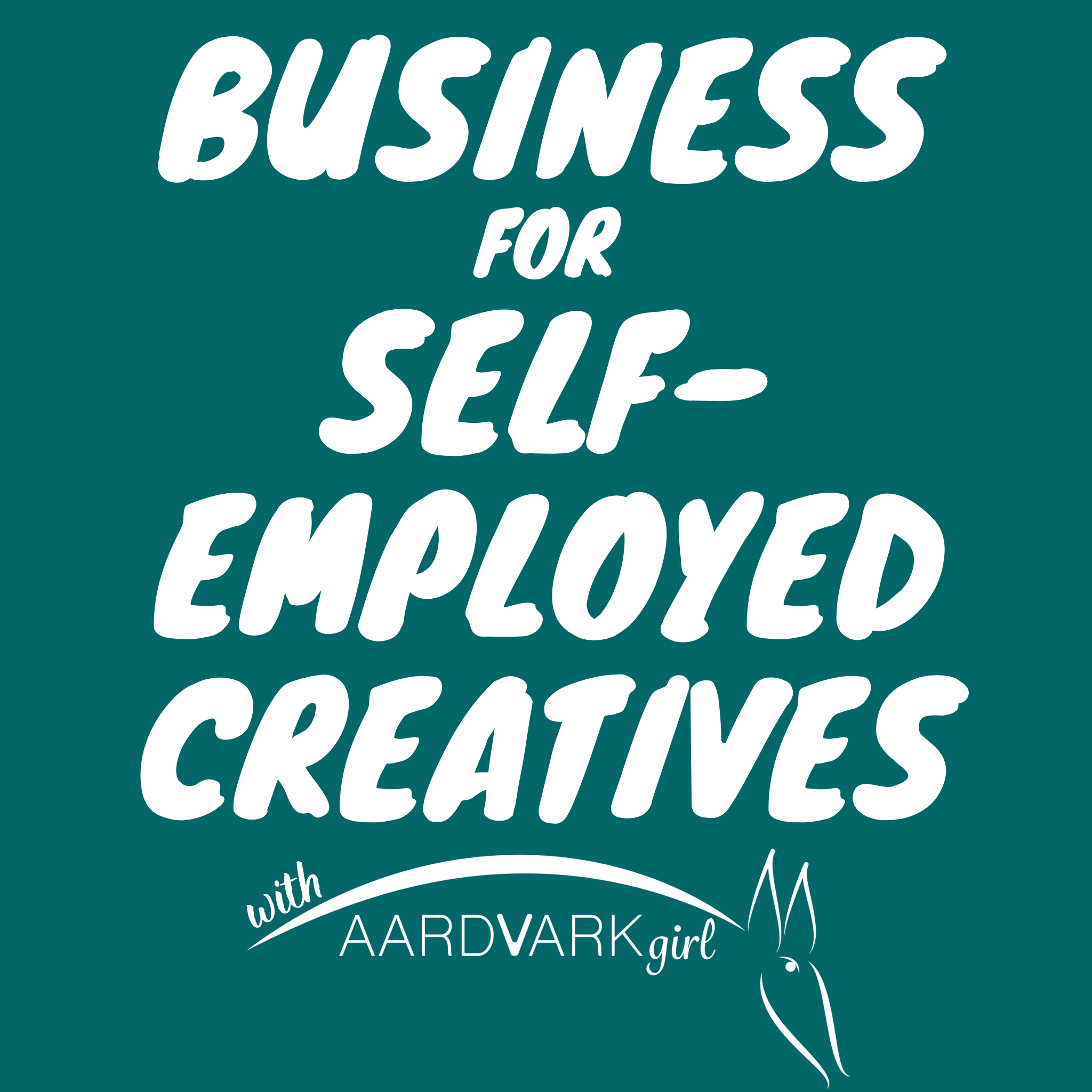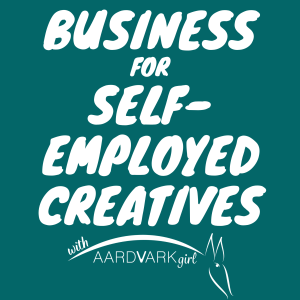
Helping business owners, freelancers & other self-employed creatives succeed… and have fun doing it. It can be overwhelming at times, but there’s nothing like the privilege of working for yourself – making your own rules, owning your time, and trusting your instincts to make the right decisions. With short episodes that get straight to the point, this podcast is about the common issues we face in business, along with solutions that work for other creatives like you. Aardvark Girl is a producer, project manager & business specialist with 20+ years of experience managing companies & helping people in creative industries. She helps you get a handle on the business side of things so you can focus on your talent. Let's get to work!
Episodes

Monday Feb 07, 2022
How to Be a Good Client
Monday Feb 07, 2022
Monday Feb 07, 2022
I spend a lot of time talking about building relationships with clients and how to approach things from the vendor perspective. But many of us who have clients also ARE clients, because we hire other contractors to do portions of our projects. So I’m wondering how many of us put as much effort into being a good client as we expect our clients to do for us. It’s that whole idea of treat others how you want to be treated. It’s simple in concept but for some reason it seems trickier in execution.
For me, I like to think I’m consistent across the board. It’s important to me to treat all people well, regardless of whether they are paying me, I am paying them, or there’s no money involved. Kindness is my own form of currency, and one that matters a great deal to me. I wish that sentiment was shared more often, but it seems everyone has their own way. I also think it’s easier for those of us who have done freelance work ourselves to know what not to do. Most of my clients who started out as freelancers are the ones who pay the fastest and show the most appreciation for the people they hire.
There are a lot of ways to be a good client, mostly by just being a good human, but I think there are a few behaviors that form a strong foundation. Those are related to compensation, communication, respect, appreciation, and the obvious one, paying people on time.
Compensate fairly.
Let’s get the money conversation out of the way first because it does matter. When you hire someone, you’re relying on their talent and expertise to do things you can’t, don’t want to, or don’t have time to do yourself. This comes at a cost, just as you’d expect if someone was hiring you. To be a good client, don’t insult your vendor by balking at reasonable rates or trying to beat them down for a low price. It’s one thing to negotiate, but it’s another to undervalue someone’s services. They say “you get what you pay for” for a reason. You can pick cheap or good, but not both. You won’t settle for less than what you’re worth, so don’t expect someone else to do that for you.
Communicate expectations.
We all know how frustrating it can be when you think you’re on the same page with a client but then it turns out they were hoping for something different. Spare yourself and your vendors that problem by communicating properly from the beginning. Make sure to discuss what you expect in terms of hours, deadlines, and deliverables. If you have a contract, give them time to review it. If they have a contract, read it and ask any questions you may have. Everyone understands that sometimes changes are needed, but don’t be that client that asks for “one little change” 18 times and then act surprised when they bill you for that time. You probably know how it feels to be on the other end of that conversation, so you don’t want to do that to someone else.
Also, remember that communication goes both ways. You expect them to deliver on time, but you need to hold up your end of the deal as well. So if they ask you to clarify something, or they need something from you in order to move forward, don’t make them wait. Yes, you’re busy, but they’re trying to help you. If you need to send them a document, or weigh in on something, you’re only hurting yourself by not responding quickly. Every hour you delay on your end is an hour delayed on their end as well, and there’s only so much time before a deadline. You don’t want them rushing at the last minute, increasing the chance for mistakes. This is such an easy situation to avoid, but it happens all the time. Be a good client and communicate!
Respect boundaries.
Boundaries. You know how I feel about them. You probably feel similarly. It drives you crazy when a client texts you at night or during the weekend or any time outside of your normal working hours. Or when they want to have a bunch of meetings but aren’t productive during those meetings and end up wasting time you could have spent getting the actual work done. Work-life balance is important to you and you make it a priority, so you should understand that the people you hire do the same. If you had that proper communication from the beginning, you should understand each other’s work schedules and work within them.
Emergencies happen, and when you have good relationships, people will be willing to help you through them. But that should never be the norm. And it shouldn’t be because of what I mentioned before – that you waited until the last minute to do your part and now you expect them to use their personal time to get things done. You chose to work with someone because of what they can do for you, so don’t be the client who pushes away good people because you’re difficult to work with.
Express appreciation.
How often do you feel like you put in a ton of effort to do great work for a client and they don’t seem to care at all? And how meaningful is it when one of them takes a minute to send a simple thank you or in some way acknowledge what you’ve done for them? Yes, you’re doing your job and getting paid is the compensation, but doesn’t it matter a whole lot when someone actually tells you how much they appreciate you? I know it does to me. As a vendor, I don’t expect it, but it’s always nice to hear. So when I hire someone to work for me, I make sure to let them know I’m grateful for what they do. This is something that seems to be overlooked everywhere in the job world, whether you’re employed by someone or work for yourself, it seems people are quick to criticize when something is wrong, but they don’t think to praise what’s going right. When you’re the client, it’ll benefit you to make that effort and let people know that what they’re doing matters.
Pay on time.
Yes, we’re back to money, and this should seem obvious, but paying people on time is important. You hired them for a job, and they did that job for you, so don’t make them chase you down for the money they’ve earned. You don’t want to do this in your business, so why would they? And if you want to be an extra good client, pay them right away. Sure, net 30 is standard and acceptable, but how great does it feel when you send an invoice and within a few minutes you receive the confirmation that payment has been made? Remember, especially when you’re hiring freelancers, they often rely on each payment and have to carry an extra burden any time one is late. But regardless of their circumstances, you have a responsibility to pay people for the work they do for you.
One thing that has always driven me crazy is when a client uses the “I’ll pay you when my client pays me” approach. Sadly, this is common in my industry and many others, and it pushes payments back much further than it should, especially when you’re the last person in a chain. For example, a production company might hire me, but they were hired by an agency, who was hired by the end client. So if each one of those is waiting until they get paid, each delay means I’m waiting even longer. Now, if I hire a voice talent and I wait until I get paid, now they’re 4 tiers behind and is it fair for them to have to wait 60 days or 90 days or longer? No. If I hire them, I’m responsible for paying them. They can’t go to my client or the ad agency or Nike’s marketing department and ask for their money. Their deal is with me, not with them, so I need to pay them on time.
Part of running a business means being able to uphold your responsibilities. So if I hire someone, I’m paying them as soon as possible, regardless of when my client pays me. Now, fortunately, I don’t have clients who make me wait like that, but I hear horror stories all the time. I won’t do that to someone else, and hopefully you won’t either. If your financial situation is so tight that you can’t cover your bills, it’s time to work on your budget. If you can’t afford to pay someone, you shouldn’t be hiring them in the first place. There is no excuse for being a client who doesn’t pay on time. No excuse.
Be the client you’d like to have.
Businesses rely on clients. It’s kind of the way it all works. You provide a service and people hire you as a vendor because they need those services. When you need support or additional services, you hire someone else and become the client. When that happens, you can’t automatically forget your etiquette and start doing all the things you hate when your clients do it to you. Treat them like your ideal client treats you. Compensate them fairly, communicate your expectations, respect their boundaries, express your appreciation, and pay them on time. Be the client you’d like to have and you’ll have excellent working relationships with people who will make your business better and your life easier. It’s really that simple.

No comments yet. Be the first to say something!